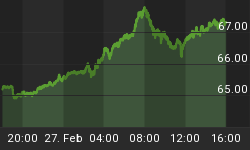Despite another triple digit drop, the Dow is down just 3.4% this week. The Nasdaq has had bigger moves between E-Trade commercials. The Dow is now about 13% below its 52-week high and 16% below it’s all-time high of January 14, 2000. This week the Nasdaq and Nasdaq 100 are off 3.2% and 2.6% respectively. The 10-year Treasury is yield is unchanged this week, as is the dollar and the euro. Gold is up about $4.
Today’s inflation numbers once again came in higher than expected. U.S. consumer prices rose 0.3% in February, or a 3.5% annual rate. That’s on the heels of a 0.6% spike in January. The core rate, for those who took advantage of the Lenten fast or who don’t pay utility bills, rose 0.3% in both months. According to the Labor Department, food, clothing and medical care led prices higher. Prescription drug prices and hospital services each rose 0.8%, a 9.6% annual rate. In addition, insurance companies are expected to jack up premiums by almost 10% this year, compared to an 8.3% increase last year. California government employees are not so lucky. The California Public Employees’ Retirement System said it looks as if health care premiums could soar 15-18%. That’s based on bids received from insurance companies thus far.
Energy costs actually fell in February although gasoline prices rose. Falling energy prices are no sure thing next month and could put pressure on the March numbers. Evidently, inflation, like money supply growth, is off the Fed’s radar screen.
Will trade once again become a political issue? The deficit widened again despite hopes for weaker imports. Believe it or not, the culprits include more imported autos and other consumer goods. Last year’s trade deficit of $369 billion was almost 40% above the 1999 level. Our biggest trade gap is no longer with Japan, but China.
Although consumers are buying more foreign goods, Proctor & Gamble announced it may cut up to 20% of its workforce. That would be the company’s second "restructuring" in two years.
Down the road in Austin, Intel has thrown in the towel on a new office building. Intel has announced it has stopped construction on the 23-story structure located on a patch of prime downtown Austin real estate. Intel must finish the structure in 10 years to earn its mega-dollar incentive package from the city. Unlike mineral rights, the benefits cannot be transferred to another party if the building is sold.
Speaking of construction, J.P. Morgan has indicated that not only is there no Chinese Wall between research and investment banking, but they have built a heavily trafficked boulevard connecting the two. According to The Times of London, JP Morgan’s head of equity research, Peter Houghton, sent a memo to his analysts explaining that before they change the rating on a stock they must get comments from the company in question, and from a JP Morgan investment banker. The Times quotes Mr. Houghton’s memo as saying, "If the company requests changes to the research note, the analyst has a responsibility to incorporate the changes requested or communicate clearly why the changes cannot be made."
I suspect the correspondence from the investment banker might go something like this:
Dear JP Morgan analyst:
This communication is in response to your memo titled, "Bonko Corp. downgraded to Probably Should Buy from Almost Definitely Buy." After carefully reviewing your memo I must respectfully disagree with your conclusions. For example, where you note that Bonko’s accounts receivable are "largely un-collectable" I would point out that we are about to close a $1.5 billion commercial paper deal. In addition, where you note that the company’s long term debt burden is such that there is "not a chance in hell the bond holders will be repaid," I would remind you that another huge subordinated debt issue could be just around the corner. While my response remained muted when you originally downgraded Bonko from Definitely Buy to Almost Definitely Buy, this additional downgrade seems a bit over the top. Did I mention there is talk of spinning off the fiber business?
…while the company might respond in this manner:
Dear JP Morgan analyst:
We at Bonko were shocked and dismayed to learn of your intention to downgrade our company’s stock based on your assessment that the recent re-pricing of management’s stock options would "significantly dilute earnings should there ever be any." This is especially disturbing since we have always been up front about our interest in "cashing out." As you know, the recent market environment has forced us to re-think this strategy of "secondary offering after secondary offering" and to focus more clearly on profits. We can assure you we are focused keenly on that objective, and in fact, the very word "profits" came up at a recent management retreat in Palm Springs. I’m afraid we must ask you to reconsider your downgrade. We also take exception to your projection of "nary a drop of free cash flow as far as the eye can see." For example, were you aware of the pending commercial paper deal?















